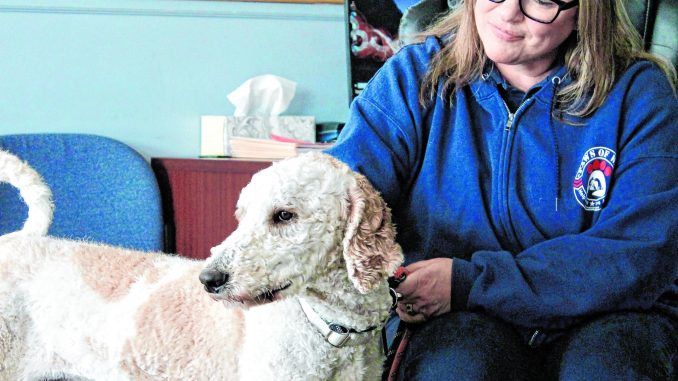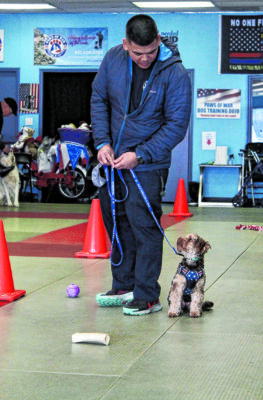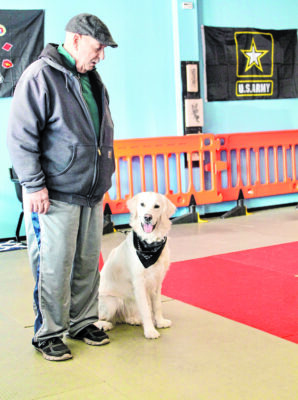
In an unassuming storefront in a Nesconset strip mall, lives are being changed. Paws of War, a non-profit with a roster of programs aimed at helping both veterans and companion animals, is approaching its ten year anniversary. Since 2014, Paws of War has brought over 300 dogs and cats rescued by troops serving overseas to safety in the U.S. They have also provided hundreds of Veterans with service and support dogs rescued from kill shelters. Their slogan is “Helping both ends of the leash; Help a vet, save a pet.” And they are living it out everyday; all of their services are free to veterans and first responders.
(Photo by Cory Olsen)
When a veteran or first responder goes through a traumatic experience, it can be hard for those who love them to know how to help. These experiences can cause people to withdraw or bottle up their feelings. It is critically important to be supported by people with similar first-hand experiences, because only they can directly relate to what the individual is going through. Paws of War is different from a traditional rescue because many of the people there are also veterans. This creates a trusting community of people who know both the challenges of military service and how much caring for a pet can ease the transition back to civilian life.

(Photo by Cory Olsen)
Kelli Porti, an army veteran herself, is the Veteran and Community Outreach Liaison. She oversees operations, coordinating volunteers and helping to evaluate and place the pets. “Our main pillars are our War Torn Pups and Cats program, which is where we rescue on behalf of service members who are on deployment overseas. We bring the rescues here and then we reunite them. We also rescue out of state and locally, often being brought on to cases that are extremely rewarding, hoarding circumstances and also with puppy mills. Then we also have our training program in our onsite training facility. We provide the training here to either be a companion animal or service animal. They all start at basic obedience.”

Other programs in their cadre include therapy pets, which often go to camps and nursing homes; a mobile vet clinic called “Vets to Vets” that provides free pet wellness to veterans and first responders; Helping Heroes, which assists with home repairs and maintenance; and an outreach that helps vets care for their pets when they are un-housed or in the hospital.
Porti stated that it is the commonality of veterans helping veterans that make their organization special. “We’re not your everyday animal rescue. Because our veterans are our family, and our first responders are our family. So, you know, we have people who have moved and they come back and visit us; they keep in touch. We’re always a part of each other because veterans feel comfortable being around other veterans and first responders feel the same way.”
Companion animals can help alleviate stress, lower blood pressure, and keep people more physically active. An American Heart Association survey found that the most common ways pets help their owners de-stress is through snuggles, followed by making their owners laugh and helping them feel less lonely. For people with PTSD, having a pet gives them a reason to get out and do more.
Porti confirms that interacting with Paws of War is often the catalyst for helping traumatized veterans and first responders heal. “Veterans and first responders…dealing with PTSD, they don’t really want to leave their house. It’s very difficult for them. But now that they have this training, and they’ve been coming to class, and they’ve been socializing, (all) because they’re taking care of this animal that they love now unconditionally, that unconditionally loves them. Now they’re feeling more comfortable coming to class, then they start saying hey, I’d like to try out and help out, you know, Paws of War going to this event, so it starts extending them to get out more and just to do things that normally they wouldn’t do.”
Besides rescuing animals overseas and domestically, Paws of War is also helping animals where they are. One example is pets left behind by Ukrainian refugees. Because of the War Torn program, there was already a network in place to get necessities to the border of Poland and Ukraine and then into the areas where they were needed most.
Mike Kilano, a Marine combat veteran, volunteers at Paws of War regularly. He cites the organization with helping him heal after his service. When he left the VA hospital he had gained 75 pounds and felt adrift. It seemed like there wasn’t much worth doing with himself and he became depressed. But when he found Paws of War, his sense of purpose returned. He became more grounded and was able to go out and do things for the organization. Slowly, he gained confidence and became more comfortable.
“I want to tell people, there is light at the end,” he said, smiling and stroking one of the rescues. “There
is hope.”

Be the first to comment